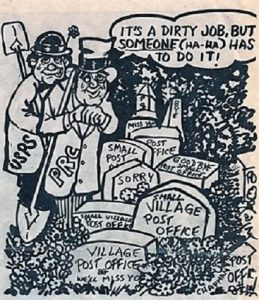 February 4, 2016
February 4, 2016
To most patrons of the post office, the questions being examined in this docket — “what, in commenters’ view, constitutes a relocation or rearrangement of postal services and is thus exempt from Commission review pursuant to section 404(d); and when or if the Commission should have jurisdiction to review the closing or consolidation of a contract postal unit (CPU)” — may seem like technical matters of little importance. When the Postal Service decides to close the post office, however, and members of the community appeal to the Commission, these issues turn out to be very significant. They determine whether the Commission will hear the appeal or simply dismiss it.
If post office closings and appeals appear to be low priority for Congress and industry stakeholders these days, it’s for a simple reason. As the Postal Service notes in its past two Annual Compliance Reports to the Commission, in FY 2014 or FY 2015 no post offices, stations, or branches were closed, and as a result the Commission has not been hearing appeals. But post office closures will eventually resume, and so will appeals. It is therefore important to address the questions that were left unresolved when the appeals slowed down, particularly those raised by Glenoaks and Careywood.
The Commission’s jurisdiction over appeals is no small matter, and this docket merits close scrutiny. I have been following post office appeals for nearly five years now, writing about them for the savethepostoffice.com website, and contributing comments to the Commission on a few key cases, like Glenoaks, Careywood, and the Bronx. I have tried to present the viewpoint of average consumers, who have nothing like the associations of mailers to represent their interests. Notwithstanding the role of the Public Representative, this situation presents challenges for the public’s interests to be articulated and heard.
While the Commission hears regularly from the major stakeholders in the mailing industry, about the only time it hears from the average person is when a post office closure is appealed. In order to be responsive to all users of the mail, it is extremely valuable for the Commission to hear appeals on post office closings when they arise. Even if the appeal fails to win a remand decision, it is the availability of due process that is important.
My concern with this docket is that the Commission is bent on interpreting 39 U.S.C. 404(d) in ways that will narrow its own jurisdiction over appeals. As a result, more and more cases will be dismissed, communities will feel that their concerns were not heard, and the public will come to feel that the role of the Commission in such matters is irrelevant. Instead of serving as a safety valve in the system and a check on errors committed by the Postal Service in its administrative process — one of the main goals envisioned by the writers of Section 404 — the Commission will be perceived as useless in the only situation in which it typically engages with the public.
As noted in the Order initiating this docket, the Commission has limited powers with respect to appeals. It cannot reverse a determination by the Postal Service to close a post office and can only remand the order back to the Postal Service for further consideration. Nonetheless, the Commission should not denigrate the significance of its authority in these matters. Appeals require the Postal Service to produce the Administrative Record, which guarantees at least some degree of transparency, and they give a community the opportunity to be heard. Whatever the Commission’s ultimate decision on an individual case, the existence of some rights of appeal obliges the Postal Service to take due care with its important responsibility of providing postal service to every community and to all parts of the Nation.
The following comments discuss the key terms at issue in this docket, review some of the main cases, and offer a few suggestions. The recurring theme is simply this: The Commission should not look for ways to narrow its jurisdiction over appeals.
Read Hutkins’ Comments Here:
Source: Postal Regulatory Commission
Steve Hutkins
About Steve Hutkins and “Save the Post Office”
Save the Post Office is edited and administered by Steve Hutkins, a literature professor who teaches “place studies” at the Gallatin School of New York University. Steve lives in a small town in New York’s Hudson Valley. He has no affiliation with the U.S. Postal Service—he doesn’t work for it, nor does anyone in his family. Like millions of Americans, he just likes his local post office, and he doesn’t want to see post offices being closed.

